Ageism
Dissatisfaction with our "gerontocracy" in Congress and the White House, while not at a fever pitch, seems to be at a constant drone now....
Ageism in Long Term Care
What is ageism?
At base level, ageism is a form of harmful stereotyping, it’s prejudice - literally prejudging people based on preconceived notions about older people. It’s about taking older individuals, who have individual life histories and stories of their own, and generally respond well to being treated with dignity, respect, and genuine curiosity - and treating them as a unitary group, “the old.”
At my workplace, the subject of ageism crops up regularly, and, I’ve found, often bites nursing and other clinical staff in the rear end. Not only is ageism not nice to people (blind prejudice usually isn’t) - it’s counterproductive. It can lead to poorer working relationships with our residents, more “behavior problems,” and poorer outcomes.
For example - I see nursing staff and others (and occasionally, I admit, myself) treating older people as if they are children: Such as nursing or other clinical staff approaching our residents with clear use of ‘baby talk’ – excessive use of “sweetie,” or “honey” - or incessantly referring to our residents as “cute.”

This often backfires - for simple reason that while this kind of language and way of communicating with elders may feel like a natural way of expressing endearment - it’s condescending. And it’s surprising how many older people, even in the throes of dementia - really don’t like it.
Or making assumptions!
Assuming that because a person is old “you’re old to understand technology,” or “you’re too old to be wearing that” (if they are wearing a more ‘youthful style.’) In fact, making assumptions is often a key issue with everyday ageism.
Ageism in Society and Public Policy
It should be noted that ageism outside of the nursing home or facility care environment, other forms of ageism are common:
Workplace: Ageism is a significant issue in the workplace, with many older workers facing discrimination in recruitment, hiring, and promotions - AARP reports that 76% of older workers see age discrimination as a hurdle to finding a new job, and more than half of these older workers are prematurely pushed out of longtime jobs
Media & Entertainment: Ageism is also present in the media, with older people often being portrayed in negative or stereotypical ways, and with older actors and performers often being overlooked for roles or being typecast in certain roles.
In healthcare policy writ large, often, age-based criteria are explicity cited as a way to control the allocation of limited healthcare resources, as is noted in this 2018 article in Contemporary Perspectives on Ageism:
Surveys… reveal public opinion supporting the idea of an age cut-off for medical services; for example, in Belgium, persons over 85 years old are considered by many citizens as “not worthy of care”… Within the UK’s National Health Service, discussions about rationing of care have frequently pointed to long-standing age-based discrimination at a systemic level… For example, until recently, the UK’s National Health Service breast cancer screening program offered regular mammography only to women under the age of 65 (the program has recently been extended up to age 70). A performance indicator in the United Kingdom sets the undesirable outcome “premature death” as occurring at or below age 75. Thus, this is a policy which does not differentiate patients based on comorbidities or clinical presentation, but on age alone. The policy also implies that human life after age 75 has less inherent worth compared to life at a younger age…
Part of this, of course, is society struggling with the concept that has swept the Western world over the past multiple decades - that of healthcare as almost entirely a public good to be managed for the “commons,” as opposed to a service that can be bought or sold by individuals.1
Regardless - ageism is a problem. Western culture is hopelessly youth-obsessed, and while greater knowledge about the special kinds of problems, risks, and challenges that older people tend of face is useful and helps to understand their unique life experiences better - there’s a fine line between that and painting all older adults with an unfair, depersonalizing broad brush.
With that out of the way….
I haven’t read much of the New Yorker Magazine in recent years, but was struck by the heated commentary on Twitter / X that was generated by this recent cover picture, which was drawn by New Yorker artist Billy Blitt, and accompanies a short article comprising an interview with Francoise Mouly, the New Yorker’s Art Editor, which you can find here,
The article itself? It’s basically a light-hearted, first-person discussion of what it’s like to deal with some of the physical vicissitudes of being older. It’s an older person talking about what it’s like to be old.
The cover art itself is a picture of former President and current GOP frontrunner, Donald Trump (77), Senator Mitch McConnell (81), former Speaker of the House. Congresswoman Nancy Pelosi (83) and President Joe Biden (80) – all pictured, in a clearly whimsical fashion, using assistive ambulation devices (walkers) while apparently competing in some kind of footrace.
Is this ageist? Is this bad?
Should the New Yorker magazine be ashamed of itself?
What the picture does for me is clearly point out the issue, in classic “a picture is worth a thousand words” fashion, that we appear to be ruled increasingly by a gerontocracy ” (defined as “a state, society, or group governed by old people”). This, to me, is a subject definitely worth discussing - at least as a really curious and potentially important sociopolitical matter.
Regardless – this cover art got a few people very mad, apparently:
Once you get past all the sturm und drang of these headlines & angry, righteous tweets, you have to start at least trying to grapple with the issue, or at least noting it somehow as significant, I think.
The fact is - our national politicians and so-called leaders have gotten quite old:
And although it’s not as obvious (since we’re only treated to one at a time, as opposed to multiple per US State), the trend for US Presidential age seems to be on the upswing as well:
The Real Issue - Age Versus Competence
In the linked blog article above, on Crunchytales.com, they go a little bit into the critical issue:
Jeannette Leardi, a gerontologist influencer (she does a lot of public education, teaching, etc.) says the following:
“Too many people are wrongfully concluding that age should be a factor when determining a candidate’s fitness to run for or hold office.“
I admit – I’m actually predisposed towards this view.
Remember, while we don’t want to paint all older people with a broad brush, we *do* wan’t to understand the unique challenges and risks they face.
For example - the single biggest risk factor for developing dementia is advanced age, dementia - or the pathological development of cognitive deficits like late-onset Alzheimer’s disease (formerly known as “senility”).
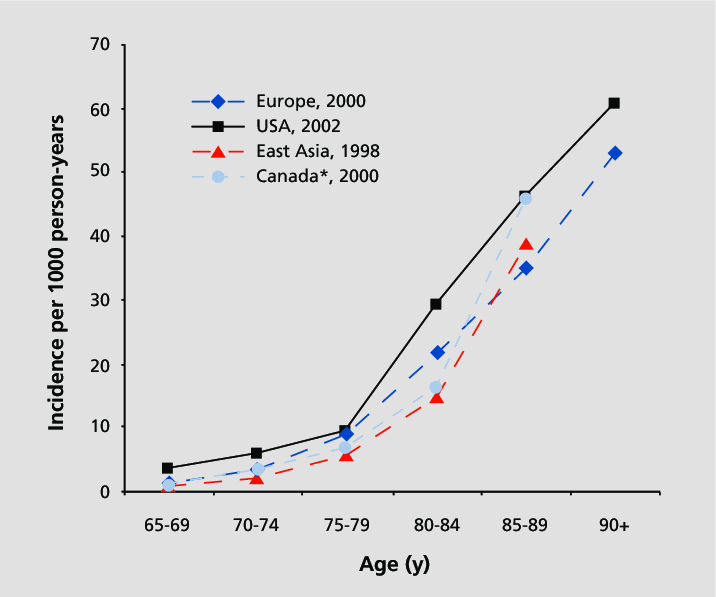
Dementia is not a part of normal aging per se, and in fact many older people can be mentally vigorous well into their so-called twilight years. A couple of notable examples - famous playwright George Bernard Shaw wrote his last play when he was 94, the year he died. Thomas Szasz, MD, the late, great libertarian psychiatrist wrote his final book at the age of 89 (“Quackery Squared”).
So, if aging by itself doesn’t mean that an older person is mentally feeble - then let’s back up to what this controversy over the New Yorker Magazine cover was about….
So…. Why was the New Yorker Article Ageist?
It’s interesting - the main reason seems to be because these major political figures are all portrayed as using assistive mobility devices (e.g., walkers), this is somehow perpetuating a harmful stereotype about our political leadership, I suppose.
It’s a bit odd. First, we don’t elect political leaders because of concerns about their mobility.
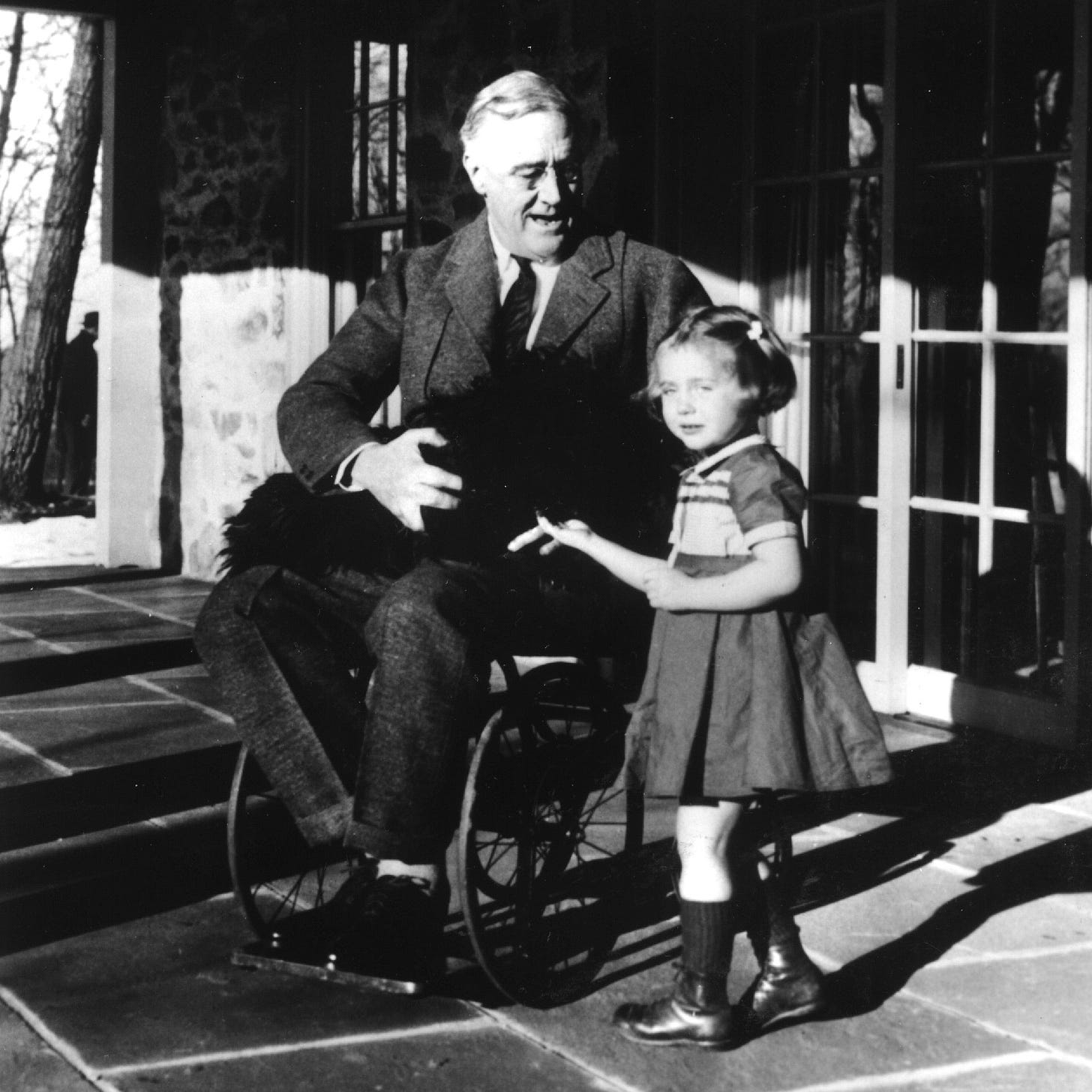
It’s worth noting that while the historically-popular president, Franklin Delano Roosevelt (FDR) and his handlers were clearly very concerned about portraying him as being wheelchair-bound or needing to use a cane, the response of the American public was clearly one of sympathy and support rather than embarassment, and it did not appear to slow his political fortunes one iota. So….

Like him, or irrationally and venomously despise him, despite being 77 and clearly at advancing-risk for developing a dementing illness (or any number of other chronic illnesses given his oft-mentioned aversion to physical excercise and love of fast food), for some reason or another people seem to be more concerned about Joe Biden’s mental competence than Trumps. Not the fact that they are both old, per se.
Americans Want Competence, and They Are Nervous about being Ruled by An Elderly Plutocrat Class - But By And Large Are Not Ageist
At the same time the average age of congress has risen steadily, the average net worth of congressmen and women have risen steadily - and the gap between the rich and the poor has risen steadily.
The problem isn’t that America is ageist. The problem is that we distrust the fact we’re being ruled by an aged plutocracy. Rule by the gerontocratic elite.
If a 65 year old wants to get a quintuple bypass, should they be ‘allowed’ to get one on Medicare? Of course, and they do - what about an 85 year old? No? Why isn’t that ageism? What if the 85 year old is worth a billion dollars and wants to spend their own money on such a procedure? Why is it denied to 85 year olds? These are complex questions!



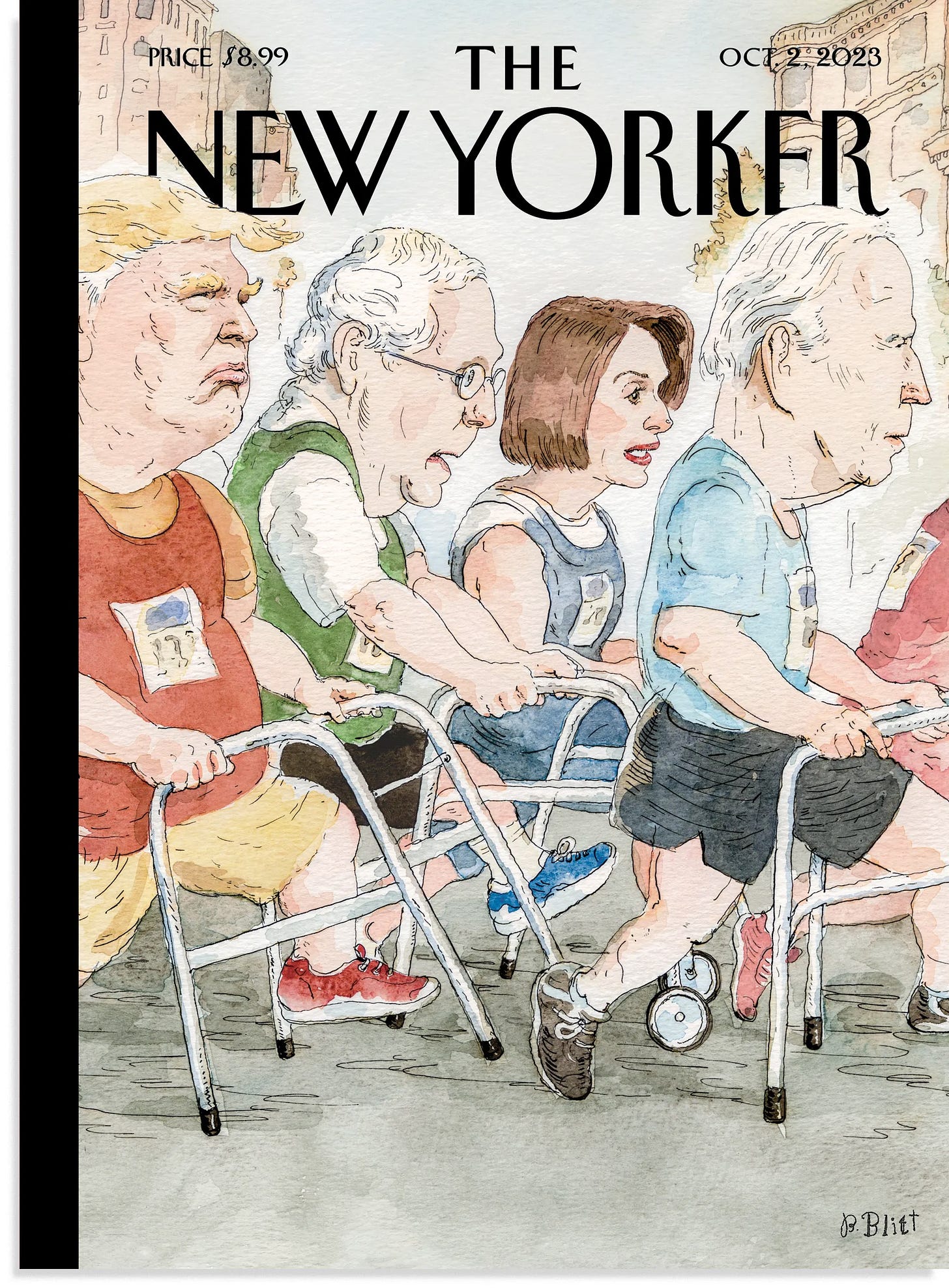



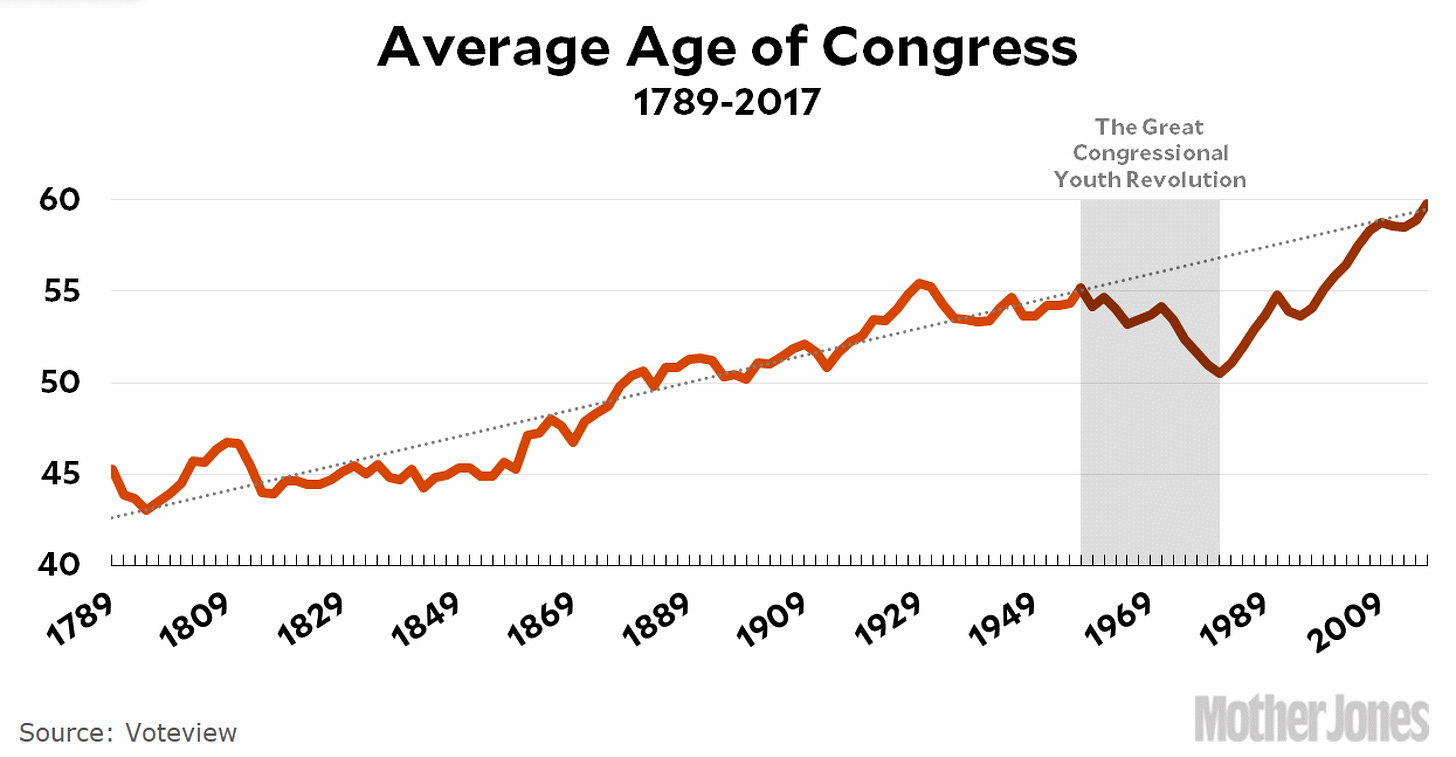

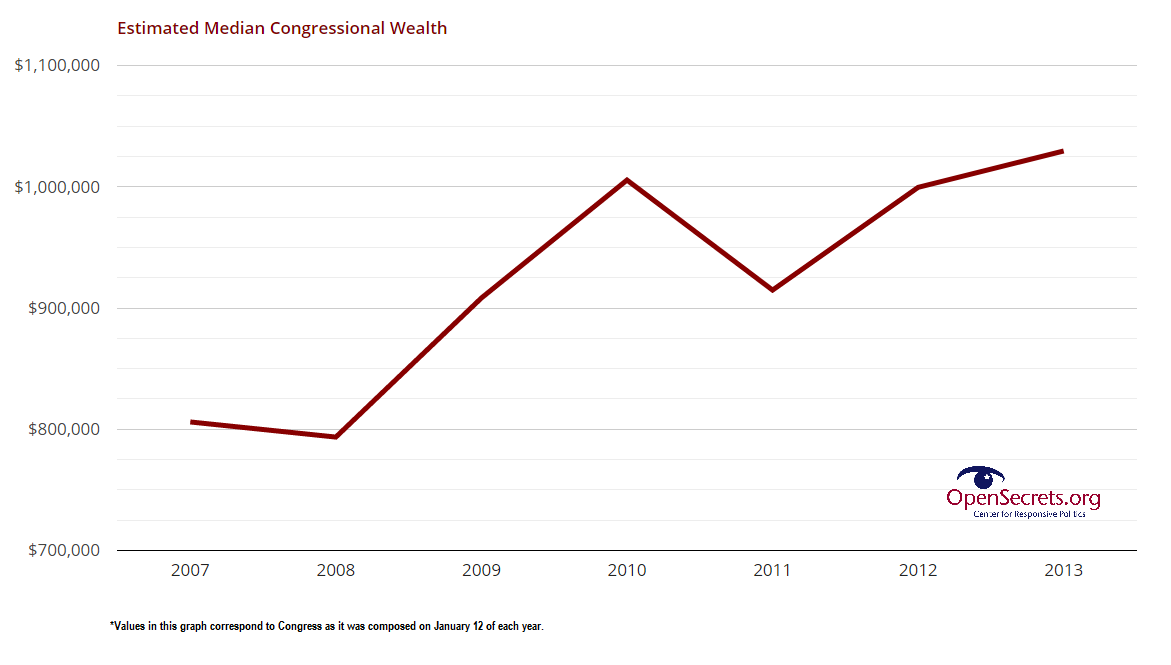
Great article. I have patients in their 90’s who are sharper than me and I have patients in their 60’s who barely know their names. My father taught me not to judge a book by its cover.
My family doctor talked down to me one. I replied - "I'm old, I'm not stupid." He never did it again. As a senior (and God how I hate that term) I see this kind of crap all the time - yet I was on social media before my grandchildren knew what it was. We have a lot to offer and it's a shame that we're so often labeled "Boomers" and dismissed.